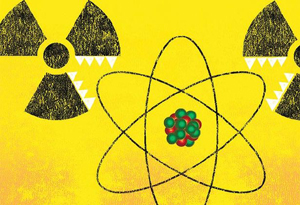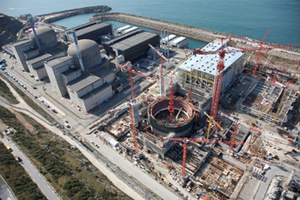Fukushima: an earthquake for the French nuclear sector
on
Fukushima: an earthquake for the French nuclear sector
Professor Jacques Foos, one of France's most highly regarded nuclear experts, is frankly shocked by the accident at the Fukushima power plant in Japan. 'The accident is an earthquake for us engineers', he says in an interview with European Energy Review. 'We all have had our convictions shaken'. Foos calls for the establishment of a global "policeman" for civil nuclear energy and a global research effort into all fields of energy. 'We need to believe in the progress of science.'
 |
| 'The Fukushima incident has been a real shock to the system' (image: The Indepedent/ Darren Diss) |
Foos has always had total confidence in nuclear energy in general and in the EPR in particular. But the Fukushima incident has been a real shock to the system, he says. 'All those engineers and technicians who had full faith in the principle of the three restricting barriers (the cladding around the fuel rods, the reactor vessel and the wall containment), all those who, like me, taught it with a lot of conviction for 40 years, have of course had their convictions shaken,' he says. 'The accident is an earthquake for us. We need to take robust decisions if we want to avoid a tsunami following in its wake.'
In Professor Foos's view, two types of decisions should now be taken:
- proceeding to a full audit of all power stations in France and, if possible in Europe and in the world. 'And if one does not fulfill safety requirements, we need to go right ahead and close it,' he says.
- give a boost to research, especially into waste processing, which is the other sensitive issue about nuclear energy. Professor Foos thinks that big summits such as the Climate Summit that took place in Copenhagen should be a place for world governance in research in all the areas of energy.
Controversy over Flamanville
With regard to audits, Professor Foos goes further than just exhortations. He has just generated a controversy by questioning the capacity of installations close to the future EPR in Flamanville to withstand nine-metre waves. With things as they are at the moment, his angry remark did not go unnoticed.
In his words: 'I had asked (in private) an official of EDF (the company that has commissioned the EPR, editor) if a nine-metre wave in Flamanville would, as in Fukushima, have submerged the diesel engines
| All those engineers who had full faith in the principle of the three restricting barriers have had their convictions shaken |
Extraordinary assembly
In Professor Foos's view, the EPR is undoubtedly the safest reactor in the world. Safety is guaranteed through a quadruple redundant safeguard system (in French: redondance-4). The system is organised into four sub-systems or “trains”. Each train, which is capable of providing 100% safety functions on its own, is installed in one of the four emergency buildings, separated from the reactor building. Simultaneous failure of the trains is thereby made impossible. The reactor building’s dual-wall containment and another compartment isolate the core completely in the event of a meltdown.
'But even if all the precautions are taken, if everything has been planned for, if a model of a power station is cutting edge, we need to work on an external accident of an unexpected size. If you set up a sophisticated anti-fire system in an office, that doesn't mean that you don't keep the firemen's phone number to hand. So we need to make the best of the power stations and also envisage all the external scenarios that could arise', he says.
So, in the case of Flamanville, where the EPR will be in front of a cliff, we need to envisage the scenario of a nine-metre wave, says Foos. 'The reactor itself is not at risk. It is high up, surrounded by several water-resistant compounds. But the diesel engines are in the least protected buildings. Even if the
| There are two arguments that I don't want to hear. The first is "it can't happen to us because we don't have earthquakes or tsunamis". The second is: "with the EPR, all the problems are solved" |
'What drove me crazy was the sequence of reactions: the experts recognised in private that, yes, a nine-metre wave could submerge the engines; the politicians think that this is the right time to extol the virtues of the French EPR; local MPs taking part in the Local Information Committee cannot meet because they are involved in election campaigning.'
Professor Foos asked for an extraordinary general assembly of the Local Information Committee. And, as the issue has created some waves, this meeting will take place. In his view, 'when you have the good luck to have a cliff close to the power station, the simplest thing to do is to install engines up above, sheltered from a wave. We have the same geographic situation in Penly, where we're going to build the second French EPR and I suggest that we do the same thing there.'
Nuclear energy policeman
The French government has already planned an audit of the 58 nuclear power stations and France's Prime Minister François Fillon has announced that if a power station does not pass the tests in a satisfactory way, it will be closed down. Fillon has taken an extra step in terms of safety by implying that the sales of power stations by Areva or EDF to foreign countries would only be authorised if these countries and their engineers come up with sufficient control safeguards.
 |
| EPR Flamanville 3 construction site in 2009 (photo: EDF Mediatheque/ Alexis Morin) |
Professor Foos continues to have confidence in the future of nuclear energy. One reason is that he is convinced the world cannot do without it. For years, Foos has been finetuning an energy analysis looking ahead to 2050. 'In the 20th century', he says, 'the consumption of energy went up from one to ten Gtoe (Gigatonnes of oil equivalent). In 2050, i.e. over a period of half that time span, it will go up to between 32 and 57 Gtoe, depending on the scenarios and on the assumption that the world develops in a reasonable way. If we cover the earth with wind farms and solar parks, if we develop biomass, marine energies, geothermal energies, etcetrea, and if we all make all possible energy savings, we will still be short of between five and 30 Gtoe per year if we stop producing nuclear energy.'
As to Europe unilaterally abandoning nuclear power, that would be useless, argues Foos. 'Many other
| If you set up a sophisticated anti-fire system in an office, that doesn't mean that you don't keep the firemen's phone number at hand |
'So, we cannot abandon nuclear energy,' he adds. 'It isn't a transition energy. But we need to clamp down and improve safety further, whatever it costs. Saying - as we have heard sometimes - that the EPR is "too expensive because it is too safe" is absurd. And we need to do more research.'
Progress of science
Research into radioactive waste is the second route out of the Fukushima crisis advocated by Professor Foos.
According to Foos, we need to go further in re-using the elements produced after the reprocessing of used fuel. Current reprocessing, an area in which France is very active, generates 35 kilos of waste per tonne of used fuel. 'From these 35 kilos, we could isolate elements that could be further exploited. For example, technetium, from which there is a negligible risk of radiation, is the best [corrosion] inhibitor for steel that we know. It could prevent corrosion, which costs billions of dollars in the world. We can also isolate the noble metals palladium and rhodium.'
In addition, very radioactive elements require storage of up to a million years. If we managed 'transmutation', i.e. modifying the cores, their life would fall to around 300 years in terms of natural radioactivity. 'We aren't able to carry out this transmutation but our children will be able to. But, for that to happen, we need to believe in the continued progress of science.'
'When I was managing a research lab at CNAM, I worked in particular on this more refined sorting of waste. At a given point, industry stopped supporting this research. The reasons for this were not just
| We aren't able to carry out this transmutation but our children will be able to. But, for that to happen, we need to believe in the continued progress of science |
'An alternative would be to put the solution on hold. In other words, to carry on with research, to put our trust in future generations, in the prospects opened up by the fourth generation of reactors and not to rush into decisions. But that’s unsettling to many people! And it requires a global research effort.'
In fact, Foos advocates a wider global research effort that goes further than just nuclear energy. He says a global system of governance in research in energy would no doubt make it possible to solve a number of problems that the whole of mankind is faced with. He believes that it is crucial that summits such as the Climate Summit in Copenhagen deal with these issues. 'Take the example of storing electricity. If we knew how to make giant batteries or be able to develop another storage technology, we would multiply the efficiency of intermittent energies such as wind or solar energy by ten. Another example is superconductivity: if we could make progress in this area, we could produce energy in the middle of deserts and then transport it to inhabited areas without losing too much energy en route.'


Discussion (0 comments)